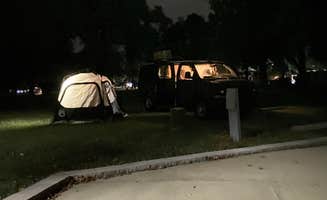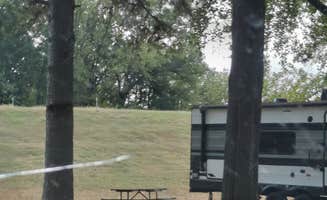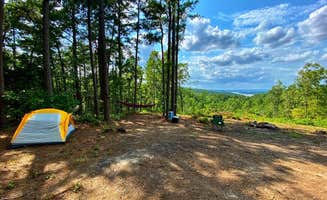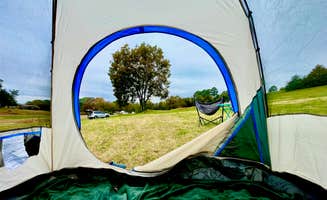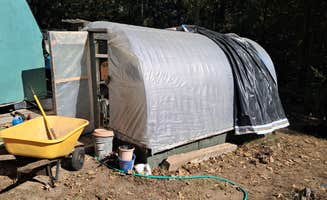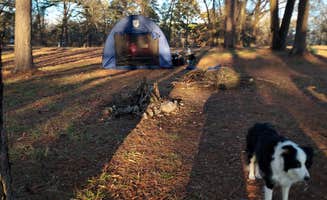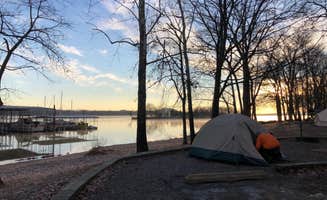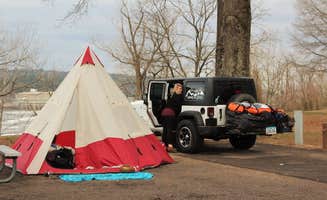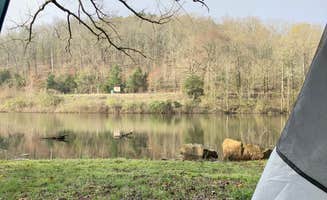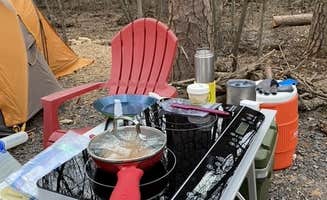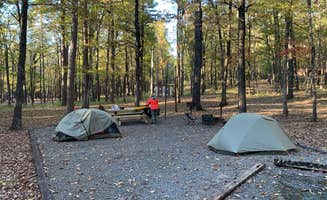The Arkansas River dominates the camping landscape near Conway, providing water recreation opportunities and scenic campsites along its banks. Dispersed camping options exist within 20 miles of Conway in multiple directions, with accessible spots for both tent campers and RVers. Seasonal flooding affects site availability from late spring through early summer, particularly at riverfront locations.
What to do
Fishing access points: Cherokee Park offers quality fishing directly on the Arkansas River with boat access. "Beautiful place located not far off I-40. Easy to get to just know you're going through downtown Morillton and past some churches then past some farmland to get out there," notes one visitor to Cherokee Park.
Bird watching opportunities: The Arkansas River corridor attracts diverse bird species including bald eagles and blue herons. A Cherokee Park camper reported "an up close encounter with a bald eagle, several blue herons, and a few river otter sightings" during their stay, highlighting the wildlife viewing potential in the area.
Swimming areas: Woolly Hollow State Park, located approximately 15 miles northeast of Conway, offers a dedicated swimming area with amenities. "There is a nice swimming area with a shop to order drinks/snacks," according to a review of Woolly Hollow State Park, which provides a controlled swimming environment when river conditions make water access unsafe.
Mountain biking trails: Some campgrounds connect to trail systems suitable for cycling. Maumelle Park allows direct access to the Pinnacle Mountain Trail system, which one reviewer described as "a shaded easy trail system that can be accessed right from this campground."
What campers like
Riverside campsites: Many campers prioritize sites with direct river views. "We got lucky with our spot, only 1 direct neighbor. Beautiful view of the Arkansas River," reports a visitor to Maumelle Park, where campsites along the water provide both scenery and privacy.
Wildlife viewing: Campers frequently mention wildlife encounters as highlights. "We have stayed at here several times. The kids enjoy the playgrounds x 3, walking, plenty of open space, and watching the barges coming down the river," notes a reviewer about their experiences at Toad Suck.
Site variety: Different campgrounds offer varied experiences from primitive to full-service. At Petit Jean State Park, a visitor explained the layout: "This popular campground is divided into 4 areas - A through D. There are a total of 125 campsites, including 26 pull-through sites. Thirty-five of the sites are Class AAA sites which have 50 amp electrical, water, and sewer hookups."
Free camping options: Budget-conscious campers appreciate the no-cost sites at Harris Brake Lake. "Just a picnic table no other amenities and the view is amazing great place to stay for free," shares one reviewer about Harris Brake Lake, located about 20 miles west of Conway.
What you should know
Seasonal availability: High water conditions affect riverfront camping. Cherokee Park has limited availability with "a 14 night maximum stay" and operates "only from March 1-October 31" according to a camper's experience.
Site levelness: Many campgrounds feature uneven sites that require leveling equipment. At Petit Jean State Park, a visitor observed that "Not all sites are level" and suggested campers should check site descriptions carefully before booking.
Insects: Mosquitoes and ticks are common, particularly in summer months. A Harris Brake Lake camper warned that "There is a lot of ticks here i pulled 7 off of me and my dog in one night," indicating the need for proper insect protection.
Cell service variability: Signal strength varies significantly between campgrounds. A Petit Jean camper reported "Received good AT&T 5G cell service, but little to no T-Mobile 2G service," demonstrating the uneven coverage in the region.
Tips for camping with families
Playground access: Multiple campgrounds offer play areas for children. Woolly Hollow State Park features "a large playground for the children" according to a reviewer who appreciated the family-friendly amenities.
Water recreation safety: River currents can be dangerous for swimming. A Toad Suck camper observed "Water flows by very fast. No swimming. Lots of fishing," highlighting the importance of water safety with children.
Educational opportunities: Some parks offer naturalist programs for children. At Woolly Hollow State Park, a homeschooling parent valued that "the state park ranger had a weekend full of planned events from a box turtle demo to a sand castle competition," providing learning experiences within the camping environment.
Site selection for privacy: Families should research specific site numbers for more secluded experiences. One Toad Suck Ferry visitor recommended selecting sites carefully, noting that "Some spots are very private Some not so much. Spots are large."
Tips from RVers
Full hookup availability: Limited campgrounds offer complete services. At COE Toad Suck Ferry, a recent visitor reported that their site was "Brand new site. Lots of shade, easy back-in, and perfectly level. Great view of the river," highlighting the recent improvements to RV accommodations.
Leveling challenges: Many sites require significant blocking for larger rigs. A visitor to Petit Jean noted that "Area C has an open sky above it" which is important for RVers requiring solar access or satellite connectivity.
Road conditions: Some access roads present challenges for larger rigs. At Toad Suck Ferry, a camper advised "There are actually two entrances to the park, recommend the second one as it has less sharp curves."
Dump station access: Not all campgrounds with electric hookups provide sewer connections. A camper at Petit Jean State Park specified that while some sites have full hookups, most offer only electric and water, requiring use of dump stations for longer stays.


